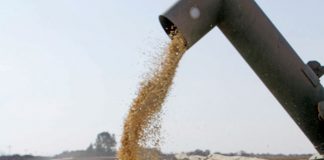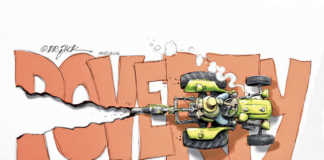Three hundred years ago, Benjamin Franklin, one of the founding fathers of the US, said: “There seem to be but three ways for a nation to acquire wealth. The first is by war, as the Romans did in plundering their conquered neighbours. This is robbery.
The second by commerce, which is generally cheating. The third by agriculture, the only honest way wherein man receives a real increase of the seed thrown into the ground, in a kind of continual miracle, wrought by the hand of God in his favour, as a reward for his innocent life and his virtuous industry.”
These words were spoken hundreds of years ago, but essentially nothing has changed and it is important that we remind ourselves how important our sector is to the country.
We should remind ourselves that without a strong and vibrant agricultural sector, our population will not have food security. Our sector may contribute only about 3% to the GDP and 10% of formal employment, but our value to the economy, when taking into account contributions of forward and backward integration in the value chain, as well as the effect of informal employment and small-scale farmers, far exceeds those figures.
We need to remember our rightful place in the economy and society, and we need to fully occupy that space. To do that, however, we need to earn the right to do so. The only way we can achieve this is by doing what is right and good.
The agricultural backdrop
Agriculture continues to experience worsening conditions arising from ongoing drought, a flagging economy, and ongoing political uncertainty. Tough times lie ahead and we will have to ride out the storm if we are to survive. These factors place additional pressure on margins, sustainability and ultimately also transformation.
Land matters seem to be at the top of the agenda at any gathering of farmers and will continue to be so for the foreseeable future. The absence of a clear, well-structured government plan for transformation is severely eroding confidence and contributing to an escalating breakdown in trust between agriculture and government. There is tremendous goodwill within the agricultural sector towards land reform and transformation, but patience is wearing thin.
We should remember that transformation is not only about land – there are countless other ways in which one can make a difference, particularly with social upliftment. These undertakings do not always require major financial input, and small things can make a big difference. We should all be doing whatever we can to make that difference.
Scarce resources
I foresee increased pressure to use scarce resources wisely in the near future. Water is one of these and dialogue has already begun in the more critical catchment areas such as the Umgeni River to improve farming practices that have an impact on water quality and availability.
While many will be quick to point out that some of the factors which have the worst impact on water quality are not related to agriculture (such as municipalities), they miss the point. In most catchment areas, agriculture and forestry occupy the largest proportion of the land area, and becoming part of the dialogue is therefore the right thing to do. You can be assured that pressure will be applied on other offenders to improve their practices, but that is not our battle.
I have committed Kwanalu to be part of this process and hope that all farmers will see and acknowledge the need to do so. There will be a greater impact on some sectors than others, particularly those who are large water-users, for example for irrigation, and who discharge large volumes of waste, but a dual approach involving a partnership between commodity producers and the authorities in geographical areas is most likely to succeed.
Some sectors and areas have already embraced this process with good results, and it is hoped that others will soon follow suit.
Farm security
Farm security and farm attacks remain of great concern. In recent weeks there appears to have been an increase in these crimes. While we remain convinced that the only motive is self-enrichment, these crimes remain unacceptable. The SAPS is to be commended for treating farm attacks as a priority and the arrest rate remains high in most cases.
We also welcome the move by the KZN MEC for Agriculture, Cyril Xaba, to establish a fund for proactive measures to improve rural safety. This was announced during Xaba’s budget speech in the KZN Provincial Legislature, and we look forward to its speedy roll-out, hopefully before the end of the year.
During August, Kwanalu held a successful diesel refund workshop in conjunction with SARS. Although claiming the refund seems to require keeping very accurate purchase and usage records, the refund is currently worth nearly R2 billion annually to agriculture. It is therefore worth complying with the regulations to ensure that one stays on the right side of the law.
The diesel refund scheme is under review and will either be scrapped altogether or re-implemented in a different form. In either case, Kwanalu and Agri SA will motivate for some form of refund system to be retained, and will lobby for an easily manageable system that does not require additional record-keeping.
It is nevertheless incumbent upon fuel users to familiarise themselves with the requirements of the Act and display integrity when using fuel and claiming the refund. Failure to do so will inevitably lead to the refund system being scrapped.
Organised agriculture in South Africa is entering exciting times.
Agri SA’s leadership is changing:
a new CEO, Omri van Zyl, and deputy executive director, Christo van der Rheede, were recently appointed and are already making an impact. Van Zyl has said that he intends to put Agri SA on ‘steroids’ and I keenly await the outcome. At the same time, I would like to thank Hans van Merwe, retiring CEO of Agri SA, for his contribution during his tenure.
However, too many of our best leaders are still not making themselves available to serve our sector and are short-sighted for not doing so. Considering my passion for the topic of leadership, I could not resist a closing quotation from George Washington, who said: “Where are our men of abilities? Why do they not come forth to save their country?
Email [email protected] for further information about the organisation.













